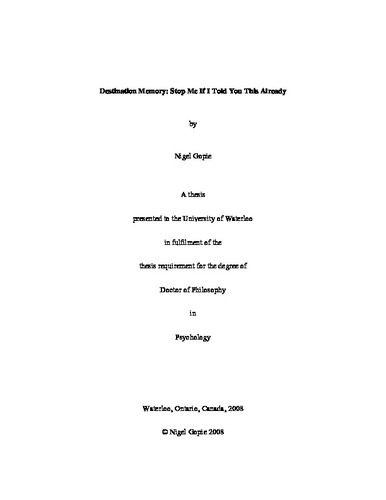| dc.description.abstract | Consider a common social interaction: Two people must each attend to and remember the other person’s behaviour while also keeping track of their own responses. Knowledge of what one said to whom is important for subsequent interactions so that information is not repeated to the same person. Remembering what one said to others is also important in the workplace where supervisors need to remember to whom they have told specific information so that they can later assess assignment progress from the relevant employee. The processes involved in remembering the destination of information will be referred to as “destination memory” in this dissertation. Although there has been extensive research regarding the processes involved in remembering the source of information, or “source memory,” there has been little to no research on destination memory. In a series of four experiments, this dissertation delineates the core features of destination memory.
In Experiment 1, a paradigm was developed to assess destination memory in the laboratory. This experiment also corroborated complaints of destination memory failures: Adults have very poor destination memory when compared to memory for the information they tell or the person to whom they tell the information. Destination memory fundamentally differs from source memory in terms of how information is transferred—“input” in the case of source memory and “output” in the case of destination memory. Attention is directed at the processes involved in transmitting information in the case of destination memory which leaves fewer attention resources for associating the information with the person one is telling it to. Therefore, it would be anticipated that destination memory would be worse than source memory.
Experiment 2 directly contrasted destination memory and source memory and confirmed that destination memory accuracy was indeed substantially lower than source memory accuracy. Because in the case of a destination event information is self-produced, attention is focused on oneself. Experiment 3 assessed whether self-focus reduces the association between the outputted information and the person that one is telling it to. When self-focus increased, so too did destination memory errors because fewer attentional resources were available to integrate the person-information pairing. This led to the prediction that, in the reverse situation where attentional resources are directed to the person-information pairing at encoding, then destination memory should improve. Experiment 4 confirmed this prediction: Destination memory was enhanced when people’s attention was shifted from themselves to the person-information pairing.
This thesis has undertaken to examine a surprisingly neglected component of normal remembering—remembering who one told something to. To study this “destination memory,” a new paradigm is introduced. Across four experiments, destination memory is seen to be quite fallible, more so than source memory. An account is offered in terms of destination memory being undermined by the self-focus that it generates. This view is reinforced by two experiments that show that increasing self-focus reduces destination memory whereas increasing environment-focus improves destination memory. Like source memory, destination memory is a key component of episodic memory, the record of our personal past. | en |

